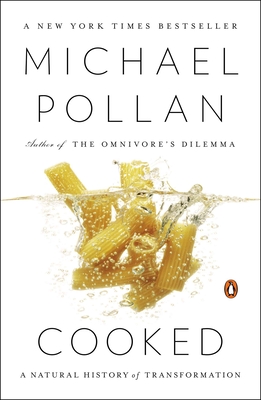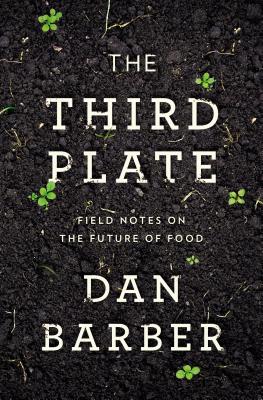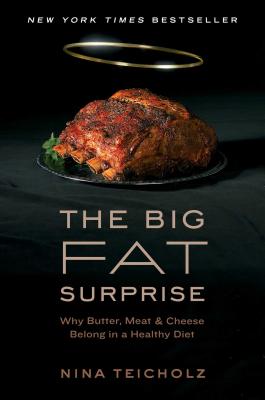In Cooked, Michael Pollan explores the previously uncharted territory of his own kitchen. Here, he discovers the enduring power of the four classical elements—fire, water, air, and earth—to transform the stuff of nature into delicious things to eat and drink. Apprenticing himself to a succession of culinary masters, Pollan learns how to grill with fire, cook with liquid, bake bread, and ferment everything from cheese to beer.
Each section of Cooked tracks Pollan’s effort to master a single classic recipe using one of the four elements. A North Carolina barbecue pit master tutors him in the primal magic of fire; a Chez Panisse–trained cook schools him in the art of braising; a celebrated baker teaches him how air transforms grain and water into a fragrant loaf of bread; and finally, several mad-genius “fermentos” (a tribe that includes brewers, cheese makers, and all kinds of picklers) reveal how fungi and bacteria can perform the most amazing alchemies of all. The reader learns alongside Pollan, but the lessons move beyond the practical to become an investigation of how cooking involves us in a web of social and ecological relationships. Cooking, above all, connects us.
The effects of not cooking are similarly far reaching. Relying upon corporations to process our food means we consume large quantities of fat, sugar, and salt; disrupt an essential link to the natural world; and weaken our relationships with family and friends. In fact, Cooked argues, taking back control of cooking may be the single most important step anyone can take to help make the American food system healthier and more sustainable. Reclaiming cooking as an act of enjoyment and self-reliance, learning to perform the magic of these everyday transformations, opens the door to a more nourishing life.
Each section of Cooked tracks Pollan’s effort to master a single classic recipe using one of the four elements. A North Carolina barbecue pit master tutors him in the primal magic of fire; a Chez Panisse–trained cook schools him in the art of braising; a celebrated baker teaches him how air transforms grain and water into a fragrant loaf of bread; and finally, several mad-genius “fermentos” (a tribe that includes brewers, cheese makers, and all kinds of picklers) reveal how fungi and bacteria can perform the most amazing alchemies of all. The reader learns alongside Pollan, but the lessons move beyond the practical to become an investigation of how cooking involves us in a web of social and ecological relationships. Cooking, above all, connects us.
The effects of not cooking are similarly far reaching. Relying upon corporations to process our food means we consume large quantities of fat, sugar, and salt; disrupt an essential link to the natural world; and weaken our relationships with family and friends. In fact, Cooked argues, taking back control of cooking may be the single most important step anyone can take to help make the American food system healthier and more sustainable. Reclaiming cooking as an act of enjoyment and self-reliance, learning to perform the magic of these everyday transformations, opens the door to a more nourishing life.
The Third Plate is chef Dan Barber’s extraordinary vision for a new future of American eating. After more than a decade spent investigating farming communities around the world in pursuit of singular flavor, Barber finally concluded that—for the sake of our food, our health, and the future of the land—America’s cuisine required a radical transformation.
The revelations Barber shares in The Third Plate took root in his restaurant’s kitchen. But his process of discovery took him far afield—to alternative systems of food production and cooking that maximize sustainability, nutrition, and flavor. Barber explores the traditional farming practices of the Spanish dehesa, a uniquely vibrant landscape that has been fine-tuned to produce the famed jamón ibérico. Along the Atlantic coast, he investigates the future of seafood through a revolutionary aquaculture operation and an ancient tuna fishing tradition. In upstate New York, Barber learns from a flourishing mixed-crop farm whose innovative organic practices have revived the land and resurrected an industry. And in Washington State he works with cuttingedge seedsmen developing new varieties of grain in collaboration with local bakers, millers, and malters. Drawing on the wisdom and experience of chefs and farmers from around the world, Barber proposes a new definition for ethical and delicious eating destined to refashion Americans’ deepest beliefs about food.
Traditionally, Americans have dined on the “first plate,” a classic meal centered on meat with few vegetables. Thanks to the burgeoning farm-to-table movement, many people have begun eating from the “second plate,” the new ideal of organic, grass-fed meats and local vegetables. But neither model, Barber shows, supports the long-term productivity of the land. Instead, he calls for a “third plate,” a new pattern of eating rooted in cooking with and celebrating the whole farm—an integrated system of vegetable, grain, and livestock production. The Third Plate is truly a publishing event: a monumental work of personal insight and global analysis that definitively remakes the understanding of nutrition, agriculture, and taste for the twenty-first century. Barber charts a bright path forward for eaters and chefs alike, daring everyone to imagine a future for our national cuisine that is as sustainable as it is delicious.
The revelations Barber shares in The Third Plate took root in his restaurant’s kitchen. But his process of discovery took him far afield—to alternative systems of food production and cooking that maximize sustainability, nutrition, and flavor. Barber explores the traditional farming practices of the Spanish dehesa, a uniquely vibrant landscape that has been fine-tuned to produce the famed jamón ibérico. Along the Atlantic coast, he investigates the future of seafood through a revolutionary aquaculture operation and an ancient tuna fishing tradition. In upstate New York, Barber learns from a flourishing mixed-crop farm whose innovative organic practices have revived the land and resurrected an industry. And in Washington State he works with cuttingedge seedsmen developing new varieties of grain in collaboration with local bakers, millers, and malters. Drawing on the wisdom and experience of chefs and farmers from around the world, Barber proposes a new definition for ethical and delicious eating destined to refashion Americans’ deepest beliefs about food.
Traditionally, Americans have dined on the “first plate,” a classic meal centered on meat with few vegetables. Thanks to the burgeoning farm-to-table movement, many people have begun eating from the “second plate,” the new ideal of organic, grass-fed meats and local vegetables. But neither model, Barber shows, supports the long-term productivity of the land. Instead, he calls for a “third plate,” a new pattern of eating rooted in cooking with and celebrating the whole farm—an integrated system of vegetable, grain, and livestock production. The Third Plate is truly a publishing event: a monumental work of personal insight and global analysis that definitively remakes the understanding of nutrition, agriculture, and taste for the twenty-first century. Barber charts a bright path forward for eaters and chefs alike, daring everyone to imagine a future for our national cuisine that is as sustainable as it is delicious.
In this well researched and captivating narrative, veteran food writer Nina Teicholz proves how everything we've been told about fat is wrong. For decades, Americans have cut back on red meat and dairy products full of "bad" saturated fats. We obediently complied with nutritional guidelines to eat "heart healthy" fats found in olive oil, fish, and nuts, and followed a Mediterranean diet heavy on fruits, vegetables, and grains. Yet the nation's health has declined. What is going on?
In The Big Fat Surprise, Teicholz reveals how sixty years of nutrition science has gotten it so wrong: how overzealous researchers have made basic scientific mistakes that, through a mix of ego and bias, allow dangerous misrepresentations to become dogma, and how scientists who dared oppose this consensus have been ostracized. For eight years, Teicholz has pored over the massive research literature and interviewed hundreds of leading experts to unravel the shockingly distorted claims of nutrition studies. She brings these researchers to life and shows how their ambitions, loyalties, and rivalries have undermined a field of research already full of difficult pitfalls.
With a lively narrative style akin to Michael Pollan's in The Omnivore's Dilemma and the scientific rigor of Gary Taubes in Good Calories, Bad Calories, Teicholz convincingly upends the conventional wisdom about "all" fats. Her groundbreaking claim is that more dietary fat leads to better health, wellness, and fitness. Science shows that reducing the saturated fat in our diets has been disastrous for our health as a nation, and we can, guilt-free, welcome these "whole fats" back into our lives.



No comments:
Post a Comment